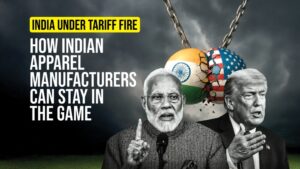
The Northern India Textile Mills Association (NITMA) has made an urgent appeal to the Union Finance Minister and members of the GST Council ahead of the Council’s deliberations scheduled for 3rd-4th September 2025, calling for immediate correction of the inverted duty structure (IDS) impacting the man-made fibre (MMF) textile value chain.
Sidharth Khanna, president of NITMA, said that while the cotton value chain benefits from a uniform 5% GST across all stages, the MMF sector continues to face distorted tax rates that undermine domestic manufacturing viability. He explained that under the current GST framework, polyester staple fibre (virgin and recycled, HSN 55032000) attracts 18% GST, polyester spun yarn (HSN 55092100 and 55092200) is taxed at 12%, while MMF fabrics and garments priced below Rs. 1,000 are taxed at just 5%.
NITMA has proposed a rationalised GST rate of 5% across the MMF value chain. Specifically, it has sought to reduce the GST rate on polyester staple fibre from 18% to 5%, and on polyester spun yarn from 12% to 5%, bringing them in line with MMF fabrics and garments, which already fall under the 5% slab.
Khanna stressed that the current disparity is creating an untenable situation for spinners, with yarn taxed at 12% while fibre remains at 18%. “If left uncorrected, this imbalance will make spinning operations financially unsustainable, potentially leading to widespread shutdowns and large-scale job losses,” he cautioned.
He pointed to several critical concerns, including 5–6% of annual turnover being locked in GST refunds, high interest costs on blocked capital, complex refund procedures, rising capital investment costs due to an 18% levy, and the competitive edge gained by imported yarns, which threatens the government’s ‘Make in India’ initiative.
Khanna emphasised that the situation represents an existential threat to the MMF industry. He appealed to the GST Council to intervene decisively, saying that correcting the inverted duty structure would not only neutralise the impact of US tariffs but also unlock growth, investment, and resilience across the MMF value chain, turning the current challenges into an opportunity.






